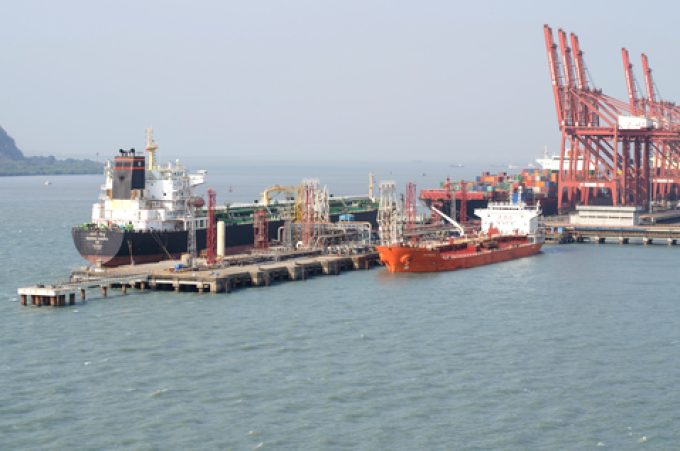Ocean and Premier alliances plan jointly operated transatlantic networks
Following yesterday’s announcement from Japanese container line ONE that it is to participate in three ...
FDX: ABOUT USPS PRIVATISATIONFDX: CCO VIEWFDX: LOWER GUIDANCE FDX: DISRUPTING AIR FREIGHTFDX: FOCUS ON KEY VERTICALFDX: LTL OUTLOOKGXO: NEW LOW LINE: NEW LOW FDX: INDUSTRIAL WOESFDX: HEALTH CHECKFDX: TRADING UPDATEWMT: GREEN WOESFDX: FREIGHT BREAK-UPFDX: WAITING FOR THE SPINHON: BREAK-UP ALLUREDSV: BREACHING SUPPORTVW: BOLT-ON DEALAMZN: TOP PICK
FDX: ABOUT USPS PRIVATISATIONFDX: CCO VIEWFDX: LOWER GUIDANCE FDX: DISRUPTING AIR FREIGHTFDX: FOCUS ON KEY VERTICALFDX: LTL OUTLOOKGXO: NEW LOW LINE: NEW LOW FDX: INDUSTRIAL WOESFDX: HEALTH CHECKFDX: TRADING UPDATEWMT: GREEN WOESFDX: FREIGHT BREAK-UPFDX: WAITING FOR THE SPINHON: BREAK-UP ALLUREDSV: BREACHING SUPPORTVW: BOLT-ON DEALAMZN: TOP PICK

Indian shippers are being hit by a wave of late vessel arrivals and port call omissions, as Red Sea-linked schedule disruptions continue to wreak havoc on container supply chains.
The majority of schedule disruptions are tied to connections serving Asia and Middle East trades, due to congestion plaguing leading hub ports in the region.
For example, CMA CGM’s Middle East-India-East Africa (MIDAS 2) loop has an upcoming port call skip for Mundra in the wake of sailing delays.
CMA CGM Agencies (India) told customers the CMA CGM San Antonio would only call at Nhava Sheva, which has an ETA of 7 July.
“Customers are requested to plan shipments accordingly,” it said.
On a normal schedule, the weekly service rotates Jebel Ali-Mundra-Nhava Sheva-Durban-Jebel Ali, using a fleet of seven vessels for a 49-day round-trip.
CMA CGM has also announced a flurry of other port omissions, including Singapore, Port Klang, Colombo and Hamburg, on various routings.
Those include the X-Press Capella, one of six ships deployed on its Asia-Subcontinent Express AS9 service, voiding calls to Port Klang and Hong Kong on its eastbound voyage. CMA CGM is a co-loader on the intra-Asia string, with tonnage provided by Evergreen, X-Press Feeders and ONE. TS Keelung is the other AS9 sailing facing schedule problems, with an upcoming blank call for Colombo.
CMA CGM has also advised customers that its intra-Asia IEX service would skip Port Klang, while its China-India Express CIX string will implement a series of port call cuts, including Singapore, Hong Kong and Port Klang, in the coming weeks.
Amid the schedule disruptions, Indian shippers and forwarders are also reporting serious space problems on vessels through July.
“Congestion continues to create havoc in the supply chain,” one executive at a Mumbai-based industrial group told The Loadstar. “Deteriorating schedule reliability has added to the longer transit times linked to the Red Sea crisis,” the executive said.
However, Sunil Vaswani, executive director of the Container Shipping Lines Association, noted that while carriers were making every effort to mitigate shipper pain points, formidable obstacles remained.
“Some of the lines have started skipping Singapore and transhipping containers at other hubs like Port Klang instead, while some have resorted to ad-hoc vessel calls to increase the capacity and push out the containers,” Mr Vaswani told The Loadstar.
He suggested that shippers and consignees should plan their shipments in sync with current market conditions, as buyers have begun placing peak-season orders earlier than usual.
At the same time, with carriers cherry-picking freight that offers higher profitability, there are also concerns that some shipping lines are increasingly relaying third-country cargo via Indian ports, which shipper sources argue has the potential to squeeze space allocations for local export loads.
That concern seems to have some merit, as there has been a sharp spike in transhipment volumes handled at the ports of Nhava Sheva and Mundra in recent months.
Contact the writer [email protected]
Listen to this clip from The Loadstar Podcast to hear Loadstar’s managing editor Gavin van Marle talk about Indian prime minister Narendra Modi’s shipping and investment challenge:
Comment on this article